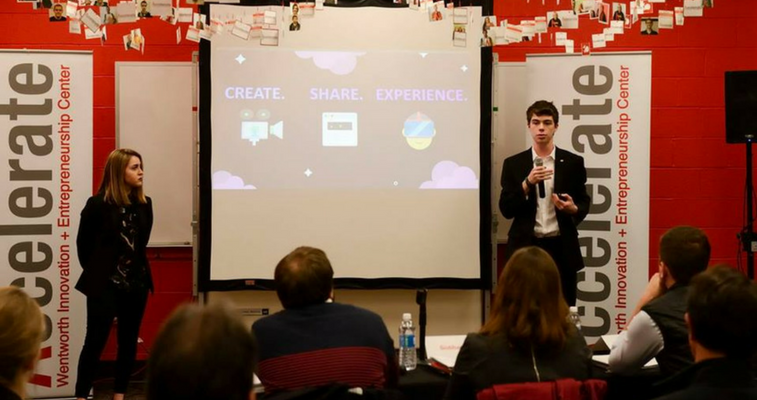Before it was a school, Wentworth Institute of Technology was originally just an idea by Boston-area businessman Arioch Wentworth in the early 1900s. When he passed away, he left behind $7 million (which, adjusted for inflation, is a little over $190 million today) to be put towards establishing a school in Boston that had an exclusive focus on industrial development.
In 1904, a board of directors was established to incorporate the Wentworth Institute, and a few years later in 1911, the school officially opened. For more than 40 years, Wentworth was a trade school for developing various engineering skills, but in 1957, they began to offer degrees, and the first baccalaureate degrees were offered in 1970.
Today, the school fosters the majority of their engineering talent for their accelerator program, named Accelerate. Since its inception in 2012, Accelerate has had 5,800 individuals participate, and more than $300,000 has been awarded to 67 student teams.
How Accelerate was formed…
After years of working in the Boston-area higher education ecosystem, Dr. Monique Fuchs felt that Wentworth Institute of Technology’s strong trajectory of a maker culture presented the ideal opportunity to become a local catalyst for disruption and innovation in the product and social impact space.

“When Accelerate launched in 2012, our focus wasn’t so much on building startups, but to help our students develop critical competencies that are going to make them successful throughout their careers,” Fuchs said. “The goal has always been to encourage innovative thinking and entrepreneurial confidence to help students reinvent and position themselves for the future of work and experiment within a safe environment.”
As the Co-Founder of Accelerate, Wentworth Innovation + Entrepreneurship Center, Fuchs has overseen its growth over the past six years to the point where 5,800 individuals have participated in Accelerate’s programs from the Startup Challenge, immersive [Social] Innovation Labs to ThinkTanks.
One of the key characteristics of Accelerate is its interdisciplinary nature. Students are not only encouraged, but are required to communicate and collaborate with one another across disciplines. This one simple, and effective attribute allows students to ideate together exploring different perspectives and approaches regardless of their current field of study. It’s not uncommon to see engineering, industrial design, computer science and business management majors working on the same startup team and even expand to disciplines and other universities beyond Wentworth’s campus.

Accelerating their mission further outside of the college campus
Accelerate’s commitment to providing students with opportunities for interdisciplinary collaboration has also extended to the Boston business community through its newly announced partnership with Workbar. This partnership will allow Wentworth students to progress their startup ideas amongst Workbar’s member community, allowing for an immersive introduction to a myriad of Boston’s best and brightest innovators.

“When we first started thinking about the idea of partnering with a coworking space it was intended to be a bridge for our students to interact with innovators and entrepreneurs, giving them inspiration and real-world insight into startup life while expanding their mentor network” said Fuchs. “It also creates an opportunity to integrate our co-op model and allows Workbar member companies to hire our students and have a direct talent pipeline into Workbar.”
Accelerate will also host events at the Workbar Back Bay location, including their ThinkTank series where industry professionals, students, faculty, and community members convene to challenge assumptions, co-create ideas, envision future scenarios and explore the defining societal challenges of our time. Workbar Back Bay hosted Accelerate’s most recent ThinkTank in February, “Future of Our Cities - Converging Generations.” Bringing Accelerate events to Workbar will help future programming reach diverse audiences and introduce Workbar community members to Accelerate’s many offerings.

“There are very few work environments that are interdisciplinary like a coworking space,” Program Director Max Rollinger said, who was appointed to the position in March. “You’re in a situation where law firms are next to startups. You have accountants who are next to marketing professionals. It’s a fantastic opportunity for our students to learn and network across multiple Workbar locations.”
With students beginning to register for their Workbar memberships, the Accelerate team and Wentworth community at large is eager to see how this new partnership will positively impact the learning and networking opportunities available to students as they take their ideas from campus to a coworking space.
Making an impact with Accelerate
Accelerators are, in a way, the unsung heroes of the startup world.
These organizations offer individuals to explore their ideas, form teams, and provide early-stage companies a chance to help grow their business. The Greater Boston area’s tech space is full of these organizations. Ask anyone who is involved with them in any capacity, and the names MassChallenge and Techstars will more than likely be brought up.
Even among other prominent accelerators in the space, it’s the versatile nature of Accelerate that has allowed the organization to grow and thrive on Wentworth’s campus. The combination of students taking in their ideas and pushing them forward through interdisciplinary collaboration has allowed Accelerate to foster innovative ideas and entrepreneurial concepts that could soon be the next big thing to come out of a school.
“We are building students’ mindsets and confidence to act on their ideas regardless if they launch a startup or work in industry,” said Fuchs. “Providing the environment and opportunity creates a microcosm for them to experiment, iterate, and fail realizing that this process can lead to solutions that can have an impact on society and the future. And that’s the sense we want them to graduate with.”
Colin Barry is an Editor & Staff Writer to VentureFizz. Follow him on Twitter @ColinKrash
Images courtesy of Wentworth Accelerate

